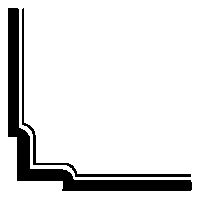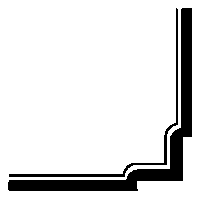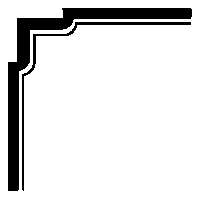
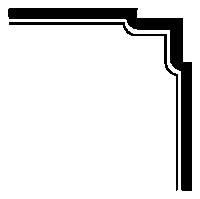 Charles Baudelaire
Charles Baudelaire

 Charles Baudelaire
Charles Baudelaire
By Robert S. Robbins
Our literary culture no longer values reverie. Most writers have adopted the puritan work ethic and pride themselves on their output. Reverie has become a quaint notion, belonging to an age of idle aristocrats and literary dilettantes. Baudelaire was fortunate to live at a time when it was respectable, or at least fashionable, to be an aesthete. J.K. Huysman's Against The Grain provides a classic portrait of the fin de siècle decadent in des Esseintes, an aesthete who had Baudelaire's works printed in a special edition. Baudelaire was a dandy himself and he squandered his early allowance on paintings and finery before slipping into lifelong debt. He valued beauty and the pleasure it gives to the point of decadence and material impoverishment.
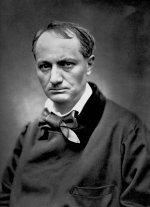 But Baudelaire's
aesthetics are more interesting than his excesses. He began the poetic
tradition of the seer in French literature. The poet believed that we could
find signs of an invisible reality in nature which he termed
"correspondences". I don't think this notion has much merit but Baudelaire
clearly expressed his exceptional understanding of the visionary,
pg 6 Wallace Fowlie
But Baudelaire's
aesthetics are more interesting than his excesses. He began the poetic
tradition of the seer in French literature. The poet believed that we could
find signs of an invisible reality in nature which he termed
"correspondences". I don't think this notion has much merit but Baudelaire
clearly expressed his exceptional understanding of the visionary,
pg 6 Wallace Fowlie
"...for whom true reality is in dreams - not the ordinary dream, but the
"hieroglyphic" dream, which is a way of knowledge and a mode of perception."
pg 39 Artificial
Paradises
"This dream, which I shall term hieroglyphic, evidently represents the
supernatural side of life."
Baudelaire also showed
remarkable insight into the limitations of alcohol and drugs. Although he
explored the hallucinations offered by wine and opium in his seminal work
Artificial Paradises, he ultimately rejected intoxicants as inferior to
the poet's reverie. This suggests he knew the sublime well enough to realize
that narcotic trances could not compare to a visionary imagination,
pg 17 Selected Writings
On Art And Literature
"...the state of drunkenness may have had its own flow of reveries, of such
surpassing beauty or strangeness, its own chain of reasoning...induce a
mental state favorable to the conjuring up of previous paradisiacal
visions."
My favorite of his poems is Parisian Dream in which the poet shows a remarkable ability to accurately describe a dream. This poem reveals that Baudelaire had an exceptional memory for dreams. I can recall long forgotten dreams if I put my mind to it and I've often wondered just how remarkable this ability may be but I've never read any studies on dream remembrance. Baudelaire makes the perceptive observation that nobody will ever see his dream. Dreams are absolutely private and can never be fully communicated although Baudelaire manages to evoke the artificial beauty of some dreams in this poem. The poem ends with a disappointing return to reality which clearly shows the author's preference for reverie.
Parisian Dream
That marvelous landscape of my dream -
Which no eye knows, nor ever will -
At moments, wide awake, I seem
To grasp, and it excites me still.
Sleep, how miraculous you are -
A strange caprice had urged my hand
To banish, as irregular,
All vegetation from that land;
And, proud of what my art had done,
I viewed my painting, knew the great
Intoxicating monotone
Of marble, water, steel and slate.
Staircases and arcades there were
In a long labyrinth, which led
To a vast palace; fountains there
Were gushing gold, and gushing lead.
And many a heavy cataract
Hung like a curtain, - did not fall,
As water does, but hung, compact,
Crystal, on many a metal wall.
Tall nymphs with Titan breasts and knees
Gazed at their images unblurred,
Where groves of colonnades, not trees,
Fringed a deep pool where nothing stirred.
Blue sheets of water, left and right,
Spread between quays of rose and green,
To the world's end and out of sight,
And still expanded, though unseen.
Enchanted rivers, those - with jade
And jasper were their banks bedecked;
Enormous mirrors, dazzled, made
Dizzy by all they did reflect.
And many a Ganges, taciturn
And headless, in the vaulted air,
Poured out the treasure of its urn
Into a gulf of diamond there,
As architect, it tempted me
To tame the ocean at its source;
And this I did, - I made the sea
Under a jeweled culvert course.
And every color, even black,
Became prismatic, polished, bright;
The liquid gave its glory back
Mounted in iridescent light.
There was no moon, there was no sun, -
For why should sun and moon conspire
To light such prodigies? - each one
Blazed with its own essential fire!
A silence like eternity
Prevailed, there was no sound to hear;
These marvels all were for the eye,
And there was nothing for the ear.
I woke; my mind was bright with flame;
I saw the cheap and sordid hole
I live in, and my cares all came
Burrowing back into my soul.
Brutally the twelve stroke of noon
Against my naked ear were hurled;
And a gray sky was drizzling down
Upon this sad, lethargic world.
Selected Bibliography - Books In My Collection
![]() Underlined titles are not hyperlinks
Underlined titles are not hyperlinks
1. Baudelaire's Prose Poems by Edward K. Kaplan ISBN 0-8203-1218-5 ©1990 University of Georgia Press
2. Selected Letters Of Charles Baudelaire translated by Rosemary Lloyd ISBN 0-226-03928-5 ©1986 University Of Chicago Press
3. Baudelaire's "Argot Plastique" by Ainslie Armstrong McLees ISBN 0-8203-1151-0 ©1989 University Of Georgia Press
4. Baudelaire by Claude Pichois ISBN 0-241-12458-1 ©1989 Hamish Hamilton Ltd.
5. Baudelaire by Jean-Paul Sartre ISBN 0-8112-0189-9 ©1950 New Directions
6. The Parisian Prowler translated by Edward K. Kaplan ISBN 0-8203-1163-4 ©1989 University Of Georgia Press
7. Paris Spleen translated by Louise Varese ISBN 0-8112-0007-8 ©1970 New Directions
8. Echoes Of Baudelaire translated by Kendall Lappin ISBN 1-878580-27-2 ©1992 Asylum Arts
9. Artificial Paradises translated by Stacy Diamond ISBN 0-8065-1483-3 ©1996 Citadel Press
10. Baudelaire's Voyages by Jeffrey Coven ISBN 0-812-1999-5 ©1993 Bulfinch Press
11. Baudelaire translated by Richard Howard ISBN 0-679-42910-7 ©1993 Everyman's Library Pocket Poets
12. Selected Poems translated by Carol Clark ISBN 0-14-044624-9 ©1995 Penguin Classics
13. Selected Writings On Art And Literature translated by P.E. Charvet ISBN 0-14-044696-0 ©1992 Penguin Classics
14. Intimate Journals translated by Christopher Isherwood ISBN 0-87286-146-5 ©1990 City Lights Books
15. Baudelaire As A Literary Critic translated by Lois Boe Hyslop & Francis E. Hyslop Jr. Library Of Congress 64-15067 ©1964 Pennsylvania University Press
16. Baudelaire by Enid Starkie Library Of Congress 57-13080 ©1958 New Directions
17. Flowers Of Evil translated by Wallace Fowlie ISBN 0-486-27092-0 ©1992 Dover Publications
18. The Flowers Of Evil & Paris Spleen translated by William H. Crosby ISBN 0-918526-86-8 ©1991 BOA Editions Ltd.
19. The Flowers Of Evil edited by Marthiel and Jackson Mathews ISBN 0-8112-0006-X ©1958 New Directions
20. Baudelaire by Marcel A. Ruff Library Of Congress 65-10767 ©1966 New York University Press
21. Baudelaire, Rimbaud, Verlaine edited by Joseph M. Bernstein, translated by Arthur Symon ISBN 0-8065-0196-0 ©1990 Citadel Press Book
22. The Impersonal Sublime: Hugo, Baudelaire, Lautreamont by Suzanne Guerlac ISBN 0-8047-1786-9 ©1990 Stanford University Press
23. La Fanfarlo translated by Greg Boyd ISBN 0-88739-003-X ©1986 Creative Arts Book Company
24. Flowers Of Evil edited by James Laver translated ©1971 The Heritage Press in slipcover
